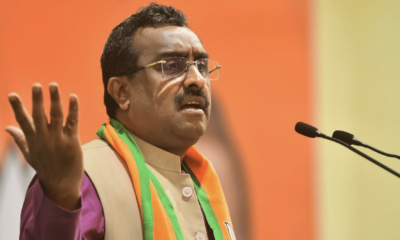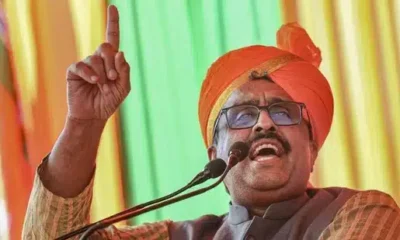(The interview was published by Indian Express on October 26, 2024. Views expressed are personal.)
As the BJP in-charge for the recent Jammu and Kashmir Assembly elections, Ram Madhav played a key role in ensuring its good showing. Although the National Conference emerged as the single largest party with 42 seatsout of 90, clinching a majority with its allies Congress and CPI(M), the BJP finished as the second largest party, bagging 29 seats, all from the Jammu region. In an interview with The Indian Express, Madhav speaks on a range of issues, including the outcome of the first J&K polls after the abrogation of Article 370 and the roadmap ahead. Excerpts:
How happy are you with the J&K poll results?
The results have been very encouraging. In this election, the BJP could re-establish its popularity in the Jammu region – we won almost all the seats in the main heartland districts of Jammu… The BJP got a vote share of 26% which is highest in the party’s history in J&K.
At a time when there were widespread claims of the valley’s opposition to Delhi following the abrogation of Article 370, our candidate in Gurez came remarkably close to victory. In another constituency in South Kashmir, considered to be a stronghold of the hardliners, one of our candidates secured more than 7,000 votes. The BJP is not a pariah in Kashmir Valley, anymore. People not only resonate with us but also came forward to vote. We have to work on these strengths now. The disappointment is that with just the support it got from the Valley, the National Conference managed to form the government. With the Jammu heartland missing, the government is not representative of the entire Jammu and Kashmir. Of course, one of the Independents who won from Jammu has been given a ministry, still Jammu is missing from this government.
In your view what is the message this outcome has given to the country?
The message is that Kashmir, as far as politics and elections are concerned, is now like any other state in the country. The recent elections were not just peaceful and transparent but saw participation from all sections of the society. The process of institutional realignment that started in August 2019 has been completed … That’s the message to the entire world.
The biggest message for the political class is that people in Kashmir are not opposed to changes as a part of the administrative process. The prevalent feeling is – if you subject us (Kashmiris) to any humiliation or patriotism test, we will react differently. But if you offer changes as administrative necessity for the good of the people in the state, we will cooperate.
How far has the BJP’s political strategy in J&K succeeded? There was a delimitation process, there were many smaller parties, Independents, seen as a bid to split the votes.
Delimitation is a process that cannot be linked to this election. It was overdue, and it was decided in 2019 that it would take place soon. In a place like Jammu and Kashmir, equal representation from both the regions is requisite for any government to be successful. There were hopes of such a government being instilled post the electioneering process. But because the numbers in the Valley were overwhelmingly in favour of a party, they (a Kashmir-based party) formed the government. Ideally, the numbers should have represented both Kashmir and Jammu.
Did the BJP consider aligning with the NC?
No, never… We were hoping that we would be able to get a good number of seats and that there will be a government that will be representative of both Jammu and Kashmir. But the mandate is such that a Kashmir-centric government is in place.
Do you foresee a situation in J&K like that of the Delhi government vis-a-vis the Centre?
This government in J&K has to be looked at from an aspirational point of view. If it is continued to be seen from a 2019 prism then we miss on the larger message of the mandate. This is reflective of a very important transformation, both administrative as well as political. We could take many measures that otherwise would not have been possible. For example, bringing in all the laws that exist in the country for the benefit of the people of J&K. The messaging has to be clear and capture the social sentiments as well, not just the political ones.
We did away with it (Article 370) because it was an anomaly in the Constitution, but the larger aspect of it is that it benefited the people. It was not a show of strength of the Central government but an indicator of the Prime Minister’s message of life without Article 370 being far better than life with it. People have realised it. That’s why Chief Minister Omar Abdullah said on the very day of the results that 370 was not a priority.
Even if statehood is returned, J&K will remain a divided state, isn’t it?
“Return and Restore” are the two words that are most commonly used when talking about statehood however, that should stop. The reason being a completely new entity that J&K today is. The old Jammu and Kashmir no longer exists. Major areas, in terms of geography, are part of a separate Union Territory (Ladakh). The residual old Jammu and Kashmir is the new UT now. There is a demand, which we also talk about, and both the Prime Minister and Home Minister have made it clear that Jammu and Kashmir will get statehood. It will be a fresh state whose share and form will be decided by the Parliament. There will be discussions, and an act granting certain powers to the UT, at an appropriate time, will be put in place. Giving statehood is a commitment made by the (Central) government. When and how will be decided by the Parliament.
Our priorities are different now. More immediate issues concerning the bread and butter of the people have to be addressed first. The current government has to act on issues of industrialisation, economic activities and employment generation amongst others.
There is tension in Ladakh over its status…
Yes, because there are complicated issues. In Ladakh, the demand for the Sixth Schedule is largely to do with the specific purpose of protecting the land and jobs of the people there. Talks are on. The issues will be addressed.
How do you see the BJP growing in J&K in the future?
We are the largest Opposition party and we have a strong voice. We will grow in Kashmir Valley. too.
What’s going to be your role in the BJP in J&K?
I don’t know about it. My role in Jammu and Kashmir was limited to the elections. The party will decide about the future.
There has been talk about strained ties between the RSS and BJP…
If there was any issue, do you think I would have been given the responsibility in the party that I have? The RSS has its own role during elections and it performs that. The BJP has its own challenges… (There is) No such strain in relations.
India and China have come together after a long time to rebuild ties. Where do you see it going from here? Also, in the last few years, India has taken various steps to reduce its reliance on China. How is it going to play out?
Prime Minister Modi’s government has effected an important shift in its dealings with China and that has shown results today. It started with Doklam. Earlier, diplomatic engagements were the only resolve in times of such standoffs. Post 2014 – when incursions happened during Xi Jinping’s visit – while diplomatic channels were kept open, a strong stand was maintained on the ground too. This new policy has been one of proactive diplomacy with strong ground posturing. This new approach has paid dividends in Doklam too … Our ground posturing and perseverance made our position clear which was understood by China and helped us in securing our territorial rights.
The China – India relations are as much of an economic opportunity for both the countries as an economic challenge. The challenge of dumping has to be looked after to protect our domestic interests but that does not have to be linked to the border issues. We have to stand on our own feet while engaging with others.



